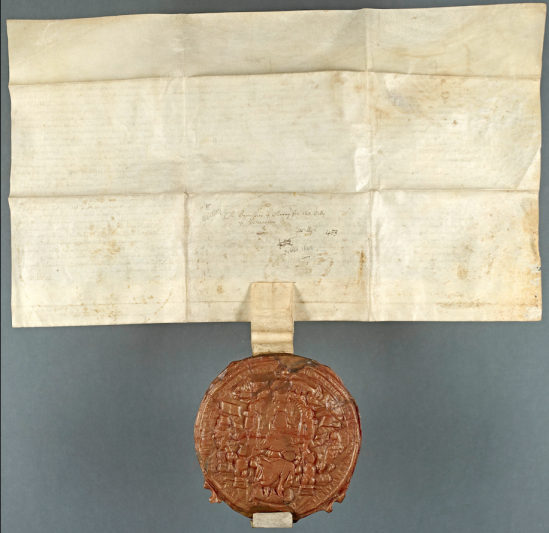Formally known as Letters Patent, those signed by the monarch - Royal Letters Patent - are uncommon and this one also has the Great Seal attached to it, reinforcing its importance and legitimacy at a time of upheaval. It is essential in the story of the civil war in the city and county, and is especially meaningful for Worcester, which sees itself as ‘the faithful city’, loyal to the king in the conflict. It is in the characteristic legal hand of the period, written by or under the supervision of Sir Richard Willys, the king’s secretary, but the official signature of the king himself is visible at the top of the document.
The Commission appointed Edward, Lord Dudley, Thomas, Lord Coventry, and Sir Thomas Littelton with 23 others, including Henry Townsend whose writings are an essential source for the civil war in Worcester – a revised edition of his diary of the siege of Worcester has recently been published. (The Diary and Papers of Henry Townsend 1640-1663 ed. Stephen Porter, Stephen K Roberts and Ian Roy, Worcestershire Historical Society, New Series 25, 2014).
The commission of array was an obsolete summons to arms to serve the king, deployed in the middle ages but fallen into disuse until Charles I revived it in 1642. He adopted this method of calling on support because it was a personal summons to serve the king, issued at a time when Parliament was devising a rival authority, its Militia Ordinance, to call together supporters of the Houses of Lords and Commons. Charles was at Derby when he issued this document, en route from Nottingham (where he had raised his standard, thus signalling the start of armed hostilities) to Shrewsbury. The king had relied on Sir Thomas Littelton for information on the quality of support for his cause in Worcester and Worcestershire, and received no great assurances from Littelton about the reliability of the county gentry as a whole. The commission was issued by Charles to rally the leaders of his supporters in the city. By 19 September Worcester had been decided upon as a site for an armed contest between royalists and parliamentarians, and the fight itself took place at Powick Bridge on the 23rd, nine days after the commission of array was signed. It is generally regarded as the first skirmish of the civil war.
The Commission document was kept in the archives of the Lyttelton Family at Hagley Hall, Worcestershire until 1926 when it was deposited with Birmingham Public Libraries (Worcestershire Record Office was not established until 1947). A further deposit from the Lyttelton archive was made to Worcestershire Record Office in 1966 but in 1978 the new Viscount Cobham (Lyttelton) withdrew most of both collections for sale to meet his father's death duties. In 2010 much of the remainder of the archive at Hagley was accepted in lieu of inheritance tax by HM Government and permanently allocated to what is now Worcestershire Archive and Archaeology Service. These were subsequently catalogued with the assistance of a grant from the National Archives and are available for public research at The Hive. This historic document will be held in our secure strong-rooms at The Hive and next year will feature as part of the refurbished displays at the Commandery Civil War Centre in Worcester.
